This Kenyan Team Travelled From Lamu To Zanzibar On A Dhow Made From 100% Recycled Plastics And Flipflops

History was made in the early days of 2019 when the world’s very first traditional dhow made entirely from recycled marine plastic and flipflops set sail from Kenya’s Lamu Island in an unprecedented 500-kilometre voyage to Stone Town in Tanzania’s famous Island of Zanzibar.
The historical journey which came to a successful conclusion on February 7, having begun on January 24, was the culmination of several months of work embarked upon by a team of Kenyan boat builders who are passionate about ridding the planet’s waters of plastic waste.
The project dubbed “Flipflopi” (also the name of the vessel) sent the world’s first “flipflop dhow” into the Indian Ocean in an effort to spread the word against the use of single-use plastic.

Source: mobile.nation.co.ke
The project was intended as a crusade for the ‘plastic revolution’ – a campaign aimed at creating awareness on the cons of single-use plastics and curbing wanton dumping of discarded plastic into the world’s oceans by playing up ways in which plastic waste can be repurposed. Thus, encouraging recycling.
The Flipflopi dhow was designed as a first-of-its-kind 10-metre long sailing boat, weighing about 5 tonnes and made from twice that weight in discarded plastic recovered from beaches and islands around Lamu, along the north of Kenya’s coast.
The rainbow-coloured spectacle was unveiled last September in a launching ceremony that drew attendance from a host of Kenyan dignitaries and locals who had participated in several beach clean-ups during the two years it took for the project to come to a head and were predictably anxious to see the result of their efforts.
Well, in this case, it was a marvellous result and if it hadn’t been that the dazzling dhow didn’t exactly cost much to put together (as it was basically made out of waste), it may have felt like a good time to drop the cheeky line; “money well spent.”
According to the United Nations Environment Program (UNEP), only nine percent of the nine billion tonnes of plastic the world has ever produced has been recycled.
The staggering amount of plastics – including plastic drinking bottles, plastic bottle caps, food wrappers, plastic grocery bags, plastic lids, straws and stirrers, and styrofoam containers – are designed to be thrown away after a single use, ultimately ending up in landfills and the environment.
Many of these plastics end up in oceans, polluting water bodies and even finding their way into the bellies of sea animals – clogging the stomachs of those poor creatures until they starve to death.
Hence, another worrying statistic from UNEP which suggests that, at the current rate, the fish in the oceans will be outnumbered by pieces of plastic by the year 2050 – threatening marine ecosystems, wildlife, and tourism.
The situation has prompted a number of countries to put forth legislation to tackle the problem, with Kenya, in particular, choosing to clamp down on the menace by sanctioning stringent laws which could see manufacturers or users of single-use plastic serve jail terms or pay hefty fines.

Two years on from abrogating what is considered the world’s toughest laws on single-use plastic bags, the Flipflopi project is leading a campaign to change the public’s perception of plastics in Kenya and beyond.
The concept was birthed in 2016 by the project’s co-founder, Ben Morison, who was inspired to visually depict the “plastic revolution” after observing with dismay how plastic waste had taken over many Kenya beaches, endangering both marine and terrestrial life. Most of his childhood was spent around those beaches and the sentiment may have afforded him that extra push.
Having found capable project team leaders in Ali Skanda and Dipesh Pabari, work soon got underway in what was to become a one-of-a-kind vessel put together with the very materials that had become a menace on the planet’s ocean fronts.
Team lead, Ali Skanda, supervised the collection of the discarded plastics which were found in large quantities during several organised beach clean-ups in the area.
Using locally-sourced technology, those materials were sorted, shredded, heated, and remoulded. Ali and his team of traditional dhow builders carved the resulting plastic parts as they would do wood.
With no playbook to refer to, Ali; a celebrated boat builder in Lamu, had to improvise and develop first-of-its-kind techniques at virtually every turn. But in the end, the team has pulled it off with aplomb.
The keel, ribs and structural elements are all made from recycled plastic, including bottles and bags, while the hull and decking are covered completely by colourful sheets of re-purposed flipflops which were found in quite copious amounts around the beaches on the island. Every single detail on the boat was constructed by hand.
“We are proud to have built the world’s first sailing boat made from recycled plastic,” says Ali Skanda. “The next challenge is to set sail and inspire people up and down Africa’s coastline and beyond to look at plastic waste not as trash but as a resource that can be collected and used.”

The voyage from Lamu to Zanzibar was the result of concerted efforts between the Flipflopi Project and the UN Environment’s Clean Seas campaign. During the expedition, there were stops at various communities to spread the plastic revolution gospel and change mindsets.
In order to continue with the advocacy for the recycling and repurposing of single-use plastics, the project is now building a bigger vessel from recycled plastics; a 20-metre boat that will help take the message beyond the region and around the world.
For its debut trip, the new dhow will cover 5000+ kilometres in an audacious three-month-long voyage to Cape Town. And that might just make it the world’s single most recognisable symbol of the global crusade against single-use plastics.
Featured Image Courtesy: cnn.com